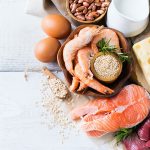Carbohydrates have been given a bit of a bad reputation over the last few years and honestly, this is completely undeserved. Many people think that carbohydrates lead directly to fat storage and therefore are pretty much solely responsible for weight gain and/or preventing fat loss. This is simply not true. The truth is that carbohydrates, unless consumed in large amounts (100’s of grams per day), will not ordinarily convert to body fat! So, what actually happens when we eat ‘carbs’ and why are they associated with weight gain?
When we eat carbs, our body releases a hormone called insulin which is required to take up glucose (the digested form of carbohydrates) into the muscles and liver. These are the main storage sites for glucose in the body, and glucose molecules are made into long chains called glycogen, which is then broken down when we need glucose for energy. In order to allow the uptake of glucose to happen rapidly, insulin also stops the release of stored body fat to stop ‘competition’ for nutrients entering these cells. This means that any body fat stored in an energy surplus is usually a result of not releasing stored body fat over the course of the day, with any fatty acids from dietary fat eaten being stored in our fat cells… yet for some reason, carbohydrates get all the blame!
But what if we reduced carbs so that insulin levels were low enough that fat cells are always releasing body fat… surely this would cause more fat loss? Unfortunately, no. The problem with this idea is that it assumes fatty acids released from fat cells means that this fat is being used for energy; this is not always the case. The body still needs to have enough energy demand to utilise these fatty acids, or they are simply taken back up into fat cells and stored. It also assumes that the body cannot store dietary fat without insulin; this is also not the case and if we over consume calories from dietary fat, this will be stored as body fat. It would be silly from an evolutionary perspective for our bodies not to store excess energy, in whatever form, otherwise our ancestors would have died very quickly at times when food was scarce, and unfortunately, we are built to store excess calories and try to protect these stores for this reason, hence why weight gain is often easier than weight loss!
So what does this all mean? Ultimately, as we have discussed previously, energy balance (calories-in versus calories-out) is the key determinant of fat loss, not carbs or fat content, and for most people it is an advantage to have a balance of carbohydrates and fats in the diet that are tailored to an individual’s needs.
One important thing to note is that if we cut carbs completely, we will lose weight quickly at first. However, this mostly is due to a rapid reduction in muscle glycogen (which also holds a lot of water), as it is not being restocked with dietary carbohydrate intake. This means it is not just body fat loss and explains the rapid weight loss people have on low carb diets. However, as soon as we start to eat any carbs again, the weight goes back up, as glycogen and water is restored, and often being confused with increased body fat. This is probably one reason why carbs get the bad reputation, as people make this wrong assumption and the low carb-water rebound cycle continues.
By cutting carbs completely we are also going to be unnecessarily restricted in what we can eat, and this will likely have a negative impact on our dietary adherence. It might also affect our performance in the gym as glucose/glycogen is the only source of fuel for high intensity activities, so for those who are exercising regularly and want to lose body fat, cutting carbs completely is not just unnecessary from an energy perspective, but might also affect training output in the long run, which could slow down fat loss!
http://www.sciencedirect.com/science/article/pii/S1550413115003502
https://link.springer.com/article/10.1007/s40279-015-0393-
https://link.springer.com/article/10.1007/s40279-014-0148-z


